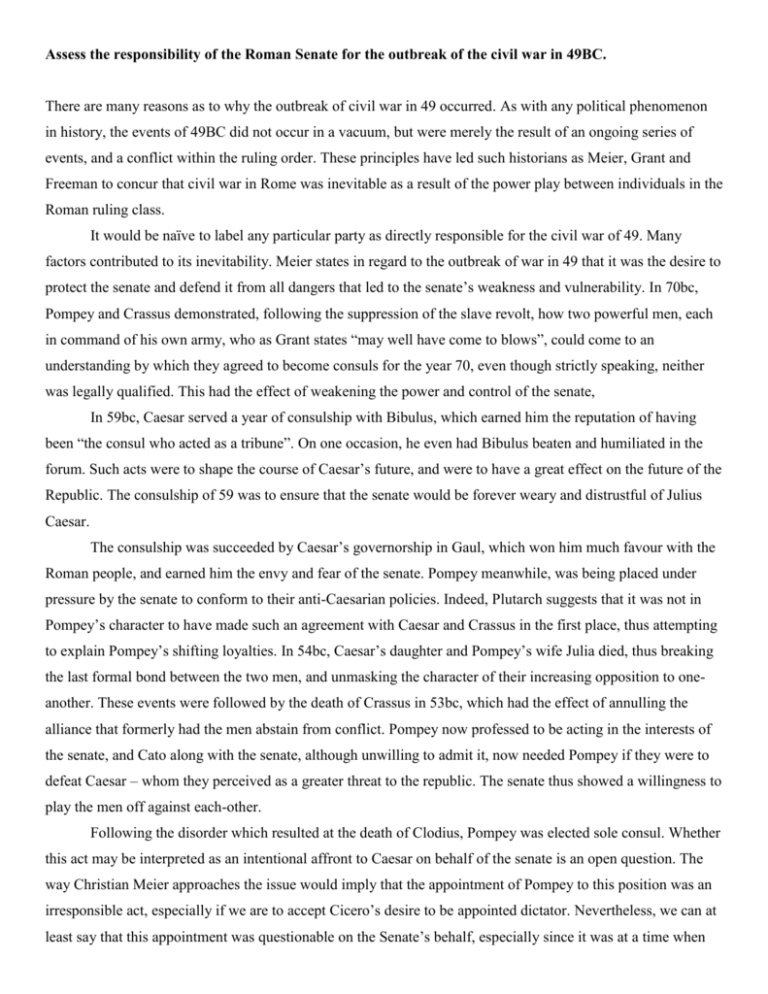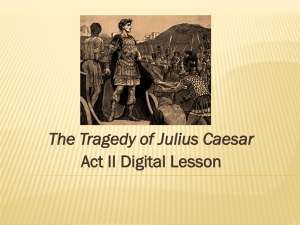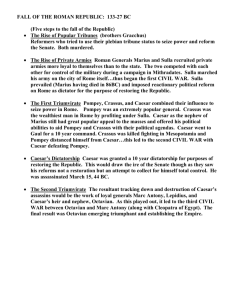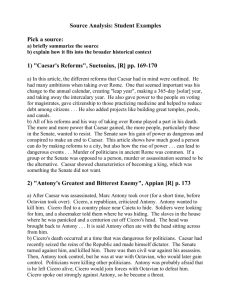Assess the responsibility of the Roman Senate for the outbreak of
advertisement

Assess the responsibility of the Roman Senate for the outbreak of the civil war in 49BC. There are many reasons as to why the outbreak of civil war in 49 occurred. As with any political phenomenon in history, the events of 49BC did not occur in a vacuum, but were merely the result of an ongoing series of events, and a conflict within the ruling order. These principles have led such historians as Meier, Grant and Freeman to concur that civil war in Rome was inevitable as a result of the power play between individuals in the Roman ruling class. It would be naïve to label any particular party as directly responsible for the civil war of 49. Many factors contributed to its inevitability. Meier states in regard to the outbreak of war in 49 that it was the desire to protect the senate and defend it from all dangers that led to the senate’s weakness and vulnerability. In 70bc, Pompey and Crassus demonstrated, following the suppression of the slave revolt, how two powerful men, each in command of his own army, who as Grant states “may well have come to blows”, could come to an understanding by which they agreed to become consuls for the year 70, even though strictly speaking, neither was legally qualified. This had the effect of weakening the power and control of the senate, In 59bc, Caesar served a year of consulship with Bibulus, which earned him the reputation of having been “the consul who acted as a tribune”. On one occasion, he even had Bibulus beaten and humiliated in the forum. Such acts were to shape the course of Caesar’s future, and were to have a great effect on the future of the Republic. The consulship of 59 was to ensure that the senate would be forever weary and distrustful of Julius Caesar. The consulship was succeeded by Caesar’s governorship in Gaul, which won him much favour with the Roman people, and earned him the envy and fear of the senate. Pompey meanwhile, was being placed under pressure by the senate to conform to their anti-Caesarian policies. Indeed, Plutarch suggests that it was not in Pompey’s character to have made such an agreement with Caesar and Crassus in the first place, thus attempting to explain Pompey’s shifting loyalties. In 54bc, Caesar’s daughter and Pompey’s wife Julia died, thus breaking the last formal bond between the two men, and unmasking the character of their increasing opposition to oneanother. These events were followed by the death of Crassus in 53bc, which had the effect of annulling the alliance that formerly had the men abstain from conflict. Pompey now professed to be acting in the interests of the senate, and Cato along with the senate, although unwilling to admit it, now needed Pompey if they were to defeat Caesar – whom they perceived as a greater threat to the republic. The senate thus showed a willingness to play the men off against each-other. Following the disorder which resulted at the death of Clodius, Pompey was elected sole consul. Whether this act may be interpreted as an intentional affront to Caesar on behalf of the senate is an open question. The way Christian Meier approaches the issue would imply that the appointment of Pompey to this position was an irresponsible act, especially if we are to accept Cicero’s desire to be appointed dictator. Nevertheless, we can at least say that this appointment was questionable on the Senate’s behalf, especially since it was at a time when the resolution of disputes between Caesar and Pompey were of paramount importance to the preservation of peace within the republic. The inevitability of Civil War was soon to be clear. Caesar requested in a meeting with Pompey, to be allowed to stand for the consulship of 48 in absentia. Pompey initially accepted Caesar’s proposals, however the senate opposed. Caesar had the tribune Curio act on his behalf, and Plutarch states: “….the claims and demands put forward by Curio on behalf of Caesar looked fair enough.” And indeed, historians, both modern and ancient almost unanimously agree that Caesar’s demands were not unreasonable, yet they were continually vetoed by Cato’s party at the senate. The situation begins to appear desperate in January of 49bc. Meier believes that at this point Caesar is attempting genuine efforts to preserve peace, and finally, with the persuasion of Cicero, offers to surrender his governorship of Gaul, leaving him only with Illyria, and one legion. Pompey however, does not give Caesar a date for which he will surrender his command, and Cato and his supporters are opposed to allowing Caesar to pursue the consulship unless it is at a private citizen. Nevertheless negotiations continued, and Grant tells us that the senate, frustrated, passed the Senatus Consultum Ultimum on the 7th of January, forcing the tribunes, Mark Antony and Curio to flee Rome and join Caesar, advising him to go to war. On the 10th of January Caesar crossed the Rubicon. Plutarch’s account, if we are to believe it, informs as that the senate’s policy was formed largely by Cato, Marcellus and Lentulus. Thus, the disintegration of Senatorial equality, which led to the pre-eminence of such men, was a major blow to the senatorial order – yet was less demonstrative of the responsibility of the Senate for the civil war, as it was a warning to the ruling class of Rome that the oligarchic regime was incompatible with the socio-political conditions of the day, in light of the size, vast wealth and incapacity of current Roman institutions to rule a world empire. The senate at the time however, could not see this. They could not envisage a new order. Rather, it perceived threats to its rule in the forms of powerful individuals – ‘outsiders’, who – irresponsibly they claimed – manipulated the masses with populare politics in order to assert their interests. It was perhaps inevitable then, as Meier believes, that the senate would come to fear the power of such individuals. And cause the policy of blatantly irresponsible opposition and refusal to negotiate with such men that could lead to a civil war. In relation to the civil war, Grant states: “in a sense, the real turning-point had come a decade earlier, when the Republic was already, to a large extent, superseded by the autocratic triumvirate. During the intervening years, its inevitable disintegration had accelerated; and now it had entered a catastrophic terminal phase.” This quote encompasses the views of both ancient and modern historians to a certain extent. Cicero had attributed the fall of the republic to a decline in morals, and this was the general view of ancient historians. Meier too, speaks of the perverted extent of Caesar’s claims to dignitas. But what these all reveal are a greater underlying cause for the calamities which befell the Roman Republic. Meier explains them by the following quote: “Ultimately it was the contradiction between the forms of the communal state and the exigencies of a world empire that led to the collapse of the republic. Montesquieu recognised this long ago. Here lay the true cause of the moral decline to which the Romans ascribed its downfall, and of its inability to bring so many abuses under control.” Thus, what all sources tell us, both ancient and modern, is that the Senate can only be held responsible for the outbreak of civil war in 49 insomuch as its power had become irrelevant, its imperialist dogma was outdated, and it had become incapable of ruling the World Empire that was the Rome. It can be held responsible in light of the fact that, due to its exclusive and reactionary nature, it allowed and gave pretext for men to find other means of gaining power. Thus is could be said that Caesar, Crassus and Pompey were driven to form the Triumvirate – which destroyed them – by the conditions imposed upon them by the senate. By excluding the plebeians from political power, and by keeping the majority of the population poor, the senate had given a reason for men such as Marius to create professional armies, with the soldiers drawn from the masses, loyal to their commander. It would only be a matter of time before such men as Caesar exploited such positions for their own purposes. BY MAKI DANALIS.









